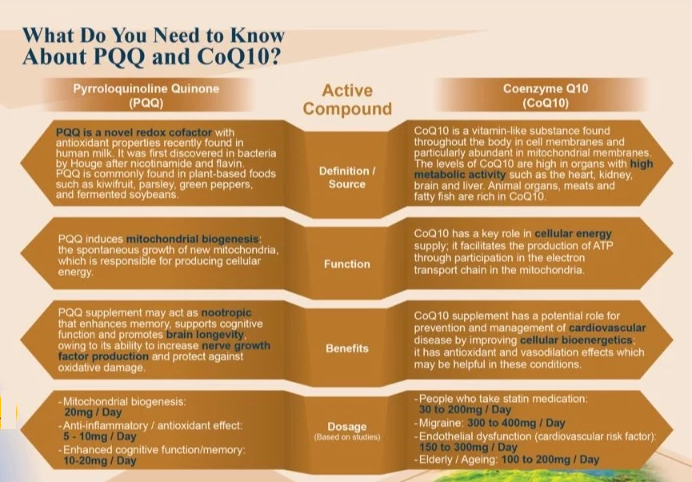
PQQ & Coenzyme Q10: The Power Duo
Share
If you don't know these two micronutrients yet, you can now change that:
1. What is PQQ?
PQQ (pyrroloquinoline quinone) is a vitamin-like substance that was discovered in 1979. Since the body cannot produce PQQ itself, it is believed that it may be a new vitamin. At the beginning of the 21st century, it was recognized as part of the vitamin B family.
Today, the substance is considered a cofactor in metabolism . PQQ is involved in important reactions, especially in the mitochondria. PQQ is also a so-called coenzyme in the body.
2. What is Coenzyme Q10?
Coenzyme Q10, also known as ubiquinone-10 or ubiquinol, is structurally related to vitamin K. But even if the term vitamin Q10 is used here and there, unlike PQQ, it is not a vitamin. Only substances that the body cannot produce itself are referred to as vitamins. Coenzyme Q10, on the other hand, is a substance produced by the body itself. It is produced using the same metabolism that produces cholesterol.
If two things belong together, then they are PQQ and coenzyme Q10. There are two important reasons for this:
> Coenzyme Q10 is particularly important for the respiratory chain and energy production. If your body is increasingly struggling with radical stress, coenzyme Q10 can no longer be regenerated as quickly. In this case, a combination of both micronutrients makes sense: PQQ supports the regeneration process because it can regenerate coenzyme Q10 directly.
> On the other hand, coenzyme Q10 is also an important supplement to PQQ. This nutrient is an important antioxidant and can reduce oxidative stress. Thus, PQQ contributes to mitochondrial health. Coenzyme Q10 promotes energy production.
Taking PQQ and coenzyme Q10 together is therefore significantly more effective than taking coenzyme Q10 alone. Regardless of whether you take the two micronutrients in the form of dietary supplements or through food: In combination, the power couple can do quite a lot within your body, support your mitochondria and improve your performance.
